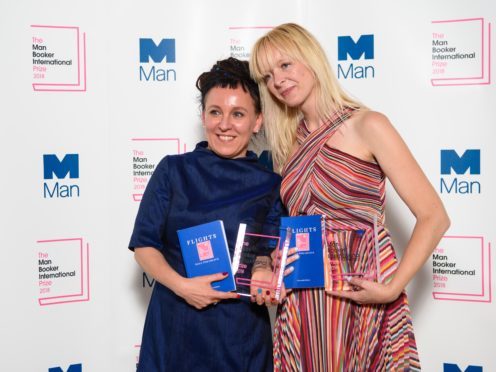An author described as “one of the greatest living writers you have never heard of” has become the first Polish winner of the International Man Booker Prize.
Olga Tokarczuk’s Flights, translated by Jennifer Croft, beat off competition from 108 submissions at a ceremony at the Victoria and Albert Museum in London on Tuesday evening.
The book is described as a novel of linked fragments, stretching from the 17th century to the present day, connected by themes of travel and human anatomy.
Lauded by judges as exploring the “contemporary condition of perpetual movement”, its 17th-century focus tells the story of Dutch anatomist Philip Verheyen, who dissected and drew pictures of his own amputated leg, discovering in doing so the Achilles tendon.
How many of the #MBI2018 shortlist have you read? Was Flights by Olga Tokarczuk, translated by @jenniferlcroft, one of them? #FinestFiction pic.twitter.com/ryjwJJDX5F
— Man Booker Prize (@ManBookerPrize) May 21, 2018
The panel, which included German poet and translator Michael Hofmann, author Hari Kunzru, journalist Tim Martin and author Helen Oyeyemi, said Flights was “also about never leaving your body, which itself is in movement and is going to die”.
“It’s a book about nomadism; it’s a book about escape, about going from place to place and living in airports. But at the same time you do inhabit a body and therefore we cannot escape the final thing, which is the Grim Reaper,” the panel said.
— Jennifer Croft (@jenniferlcroft) May 22, 2018
In the present day, it follows the trials and tribulations of a wife accompanying her professor husband on a cruise in Greece, a Polish woman residing in New Zealand who must return to her homeland to poison her terminally ill high-school sweetheart, and the descent into madness of a young husband whose wife and child mysteriously vanished on holiday before reappearing.
Tokarczuk, a multiple award winner and bestseller in Poland whose work is now gaining recognition in the English-speaking world, was described by The Bookseller last year as “probably one of the greatest living writers you have never heard of”.
My translation of Olga Tokarczuk's "Flights," from @FitzcarraldoEds, is on the shortlist for the Man Booker International Prize. https://t.co/oJEqYZjoMV
— Jennifer Croft (@jenniferlcroft) April 12, 2018
A trained psychologist, she published her first book, a collection of poems, in 1989, and has gone on to write eight novels and two short-story collections.
Chair of the judging panel, Lisa Appignanesi, labelled her a “writer of wonderful wit, imagination, and literary panache”.
She added: “Our deliberations were hardly easy, since our shortlist was such a strong one. But I’m very pleased to say that we decided on the great Polish writer Olga Tokarczuk as our winner.
“In Flights, brilliantly translated by Jennifer Croft, by a series of startling juxtapositions she flies us through a galaxy of departures and arrivals, stories and digressions, all the while exploring matters close to the contemporary and human predicament – where only plastic escapes mortality.”
Flights beat novels from France, Hungary, Spain and Iraq as well as a “meditation on colour” from South Korea which features a list of white objects.
The White Book by Han Kang, who won the prize in 2016 for The Vegetarian, tells the story of a woman who moves to a European city and is haunted by the story of her older sister, who died two hours after birth.
